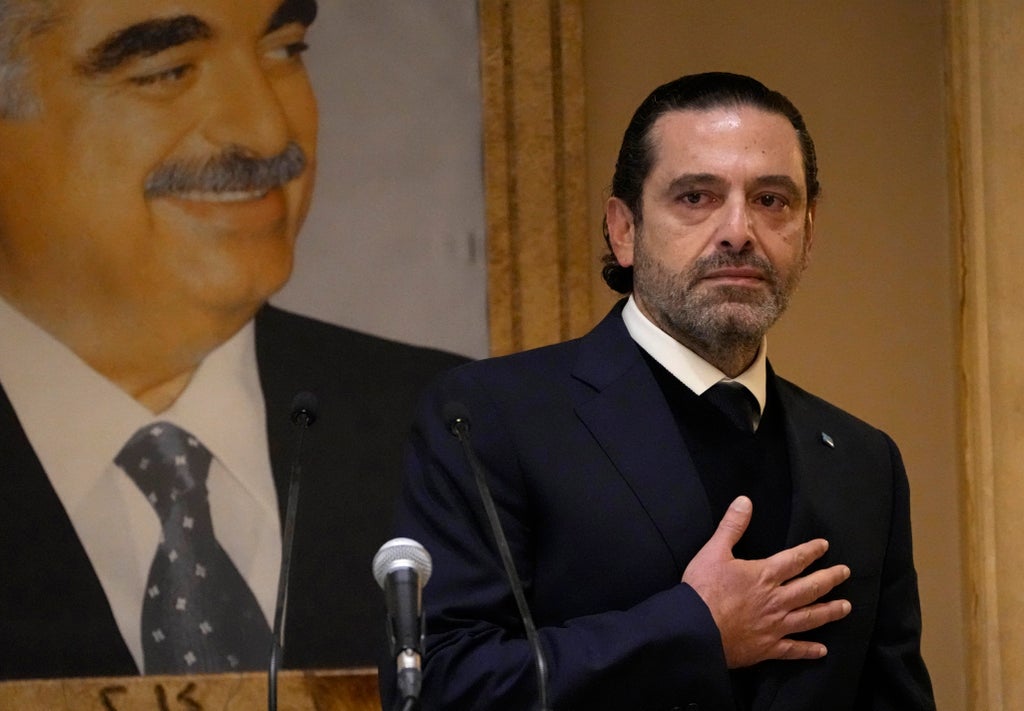
Lebanon’s three-time former prime minister Saad Hariri has announced he is bowing out of politics and will not participate in May’s parliamentary elections, dealing a potentially lethal blow to the polls in a nation suffering one of the worst economic collapses in modern history.
Mr Hariri, who was once backed by Saudi Arabia where his family made its fortune, made the announcement in an emotional speech on Monday, where he acknowledged he had failed to prevent Lebanon from tumbling into a devastating economic tailspin.
Appearing to hold back tears, the Sunni Muslim politician said that he had done all he could to prevent a civil war erupting through compromises he had made, an apparent reference to forming power-sharing governments that included the powerful Hezbollah group.
His decision marks the first time in three decades that a Hariri - one of the country’s most powerful Sunni families - will not be involved in Lebanon’s political life.
Saad Hariri, who has been prime minister twice and then most recently prime-minister designate, inherited the political mantle from his father, Rafik al-Hariri, after his assassination in 2005.
“I declare that I will suspend my work in political life and I call upon my family in the Future Movement to take the same step," Mr Hariri said, in reference to his party.
"I am convinced that there is no room for any positive opportunity for Lebanon in light of Iranian influence, international disarray, national division, sectarianism, and the collapse of the state.
"We will continue to serve our people, but our decision is to suspend any role in power, politics and parliament," he added, his voice cracking as he spoke in front of a portrait of his father.
The Future Movement’s vice president Mustafa Alloush confirmed to The Independent that the party would not be running in May’s polls and would only support future elections if there was “real positive change”. The Future Movement has long been the biggest representative of the Sunni community in the country, controlling one of the largest blocs in parliament.
“The problem is the system, the sectarian issue. And so if you are part of this system you are accused of being corrupt or a failure,” Mr Alloush added.
Lebanon’s Prime Minister Najib Mikati said that Mr Hariri’s decision not to run and to suspend his role in political life is "a sad page for the country and for him personally".
Mr Hariri’s announcement comes as the country is in the grips of one of the worst economic collapses in the last 150 years. Since the start of 2020, Lebanon has seen some of the highest inflation rates in the world, with food prices more than quadrupling and the price of medicines rising sixfold.
The sinking economy, and an unprecedented explosion at Beirut port which destroyed swathes of capital in August 2020, has stoked tensions between the country’s myriad sects.
This has led to open street battles between different religious factions with, in some instances, citizens fighting each other armed with rocket-propelled grenades.
Political figures and experts warned on Monday that the exit of one the most powerful Sunni parties may lead to a “large-scale” Sunni boycott of the polls while empowering other factions, fuelling further violence and unrest.
Lebanon’s leading Druze politician Walid Jumblatt said Mr Hariri’s decision "means a free hand for Hezbollah and the Iranians".
"We’re losing a pillar of independence and moderation,” he told Reuters.
Mohanad Hage Ali, a fellow at the Carnegie Middle East Centre, told The Independent prior to Monday’s announcement that many in Lebanon were already concerned the elections would not take place given the lack of resources in the crumbling state.
“But Hariri’s steps could see a large-scale Sunni boycott of the polls if it even takes place,” he said following the announcement.
“It adds wood to the fire, increasing the tensions to an extent that it will be difficult to hold elections under these circumstances.”







